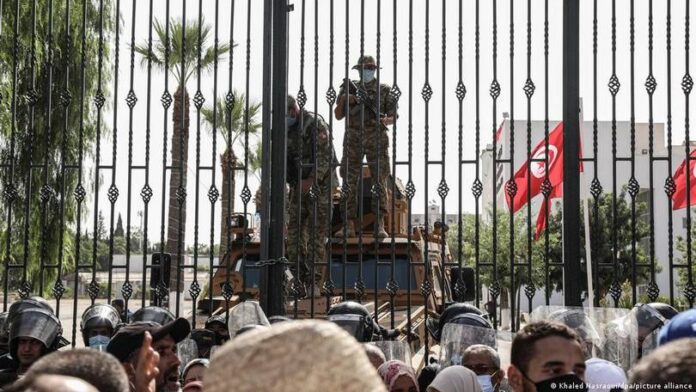Tunisia has been experiencing an “institutional deadlock” after the Parliament supported the reshaping of the executive branch. The President, Kai Said was against the move, stating that such a reshaping had not been consulted with the Governing Board. The pandemic has also aggravated Tunisia’s economic crisis. The government has had to ask the the international community for vaccines and other medical facilities. Currently, the country is in its fourth wave of Covid-19, which has caused over 18,600 deaths.
President Kai Said in response to the crisis had removed Prime Minister Hichem Mechich and ceased the Lower House’s activities for 30 days citing mismanagement of the pandemic. On Monday, the Tunisian army blocked access to several lawmakers to the Parliament building after this move.
In order to cease the Lower House’s proceedings, President Said stated that he made use of Article 80 of the Constitution. This allows for exceptional measures if there is, “imminent danger situations where there is grave danger to the unity, security and independence of the country.” He added that, in accordance with the constitution, he had also contacted the heads of key state institutions such as the head of government and the head of parliament, Hichem Mechichi and Rachid al-Ghannouchi respectively.
Said claimed that his objective was to save the Tunisian people and ensure the regular functioning of public power. The move has been challenged by many. On the same evening as the announcement (July 25th), Ghannouchi stated that contrary to the President’s statements, he had not been consulted and that there was no state emergency. Ghannouchi told the Associated Press, that the president had carried out “a coup against the constitution and the (Arab Spring) revolution.”
Many share this opinion, however, the other side as articulated by Law Professor Rabeh Karaifi to Reuters, is that Tunisia’s constitutional judges have not yet been elected. “In the absence of the constitutional court the president has the exclusive right of interpretation,” he went on to say that such a move is actually legally valid. The Constitutional Court, which has not been in function since 2015, is yet to supervise this process and decide on it is to be extended.
According to Johanners Kadura, head of Tunisia Branch Office of Friedrich Ebert Foundation, the dispute is the culmination of a long-running power struggle between the president and the prime minister and head of parliament on the other side. This has only exacerbated the economic crises that exists in the nation. National debt is at about 84 per cent in the country which is more than ever before Germany Trade and Invest (gtai). Unemployment has officially surpassed 17%, with a high percentage among young people. The pandemic has only added to the crisis. The result has been growing discontentment among Tunisian people. Protests have taken place in the country, highlighting the lack of job opportunities and poor management of the Covid-19 pandemic.
#Tunisia | Protesters demand the resumption of work and job opportunities amidst the COVID-19 pandemic. pic.twitter.com/om99vizbYM
— teleSUR English (@telesurenglish) February 13, 2021
A Constitutional court has been set up to oversee the process. It is yet to make a decision on the extension of such a move.
Read: Kongu Nadu? Gounder Nadu? Hindu Tamil Nadu



